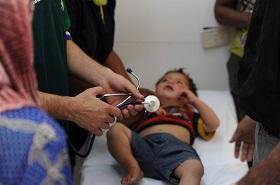Using AI to control energy for indoor agriculture
30 September 2024
Published online 30 October 2013

During a traditional Syrian meal in the southern Turkish border town of Antakya, a group of doctors looked at photographs of injured patients at a hospital in the rebel-held city of Aleppo. They spoke fervently about how, despite an acute lack of medical equipment, technology was helping save lives in Syria.
Zaher Sahloul, a critical care specialist and the president of the Syrian-American Medical Society, lives almost 10,000 km away in Chicago – but is originally from Aleppo. Sahloul has been treating patients in his war-torn homeland for more than two years — via Skype.
Several hospitals in places like Aleppo and Idlib now have electronic intensive care units (eICU) which connect critical care specialists in the US to local doctors and nurses. Using Skype and webcams they guide medics with limited experience through complicated procedures, transforming the chances of recovery for some patients.
Sahloul says the approach is unprecedented in Syria. "I can help doctors from the US. If local hospitals have the supplies, I can also train them in a variety of different surgeries," he says.
The pool of Syria's medical expertise has been much depleted as many doctors have fled in fear for their lives. Of those remaining, many have had limited training or have been trained as veterinarians. The war has provided a terrifying learning curve, with many being thrown into complicated surgeries without ever having set foot in an operating room.
Sahloul has also filmed and uploaded tutorials in Arabic to YouTube to guide doctors in Syria on how to treat external bleeding, clean wounds and suture injuries commonly sustained in conflict zones.
The psychological impact is huge. I couldn't sleep while I was there.
A Syrian internet systems engineer has encrypted the data and created virtual private network (VPN) accounts to secure online communication for Syrian medical professionals.
People in war zones are using new technologies, says Yuval Dror, from the school of media studies at the College of Management Academic Studies in Israel.
Medical staff and aid workers are popular targets for kidnappings in Syria. The innovative use of technology has facilitated a new era of medical relief, which has changed "the rules of war," he adds. "Social media brings not only the capability to document and share but also to coordinate actions and coordinate opinions."
Sahloul, who used social media to raise US$5 million worth of medical supplies for people in Syria, says that the dearth of specialists created a need for advice and guidance for local doctors on a range of medical conditions, not just trauma response. US specialists are hosting weekly Skype meetings to help general practitioners with specific health issues.
"For example, we have no nephrologists in Syria so patients do not have access to consistent doctors providing renal dialysis. Through weekly Skype meetings, we are at least able to provide some help," Sahoul says.
But while an end to the conflict looks distant, those committed to helping the wounded continue to push the boundaries to deal with the impact of war.
Back at the border town dinner, between bites of kibbeh, Monzer Yazji, who specializes in internal medicine and frequently visits Syria to assist those on the ground, pointed out that that the majority of doctors working there have post-traumatic stress disorder.
"When they're seeing 50 patients a day, they can become desensitized, agitated," he says. "The psychological impact is huge. I couldn't sleep while I was there."
doi:10.1038/nmiddleeast.2013.196
Stay connected: